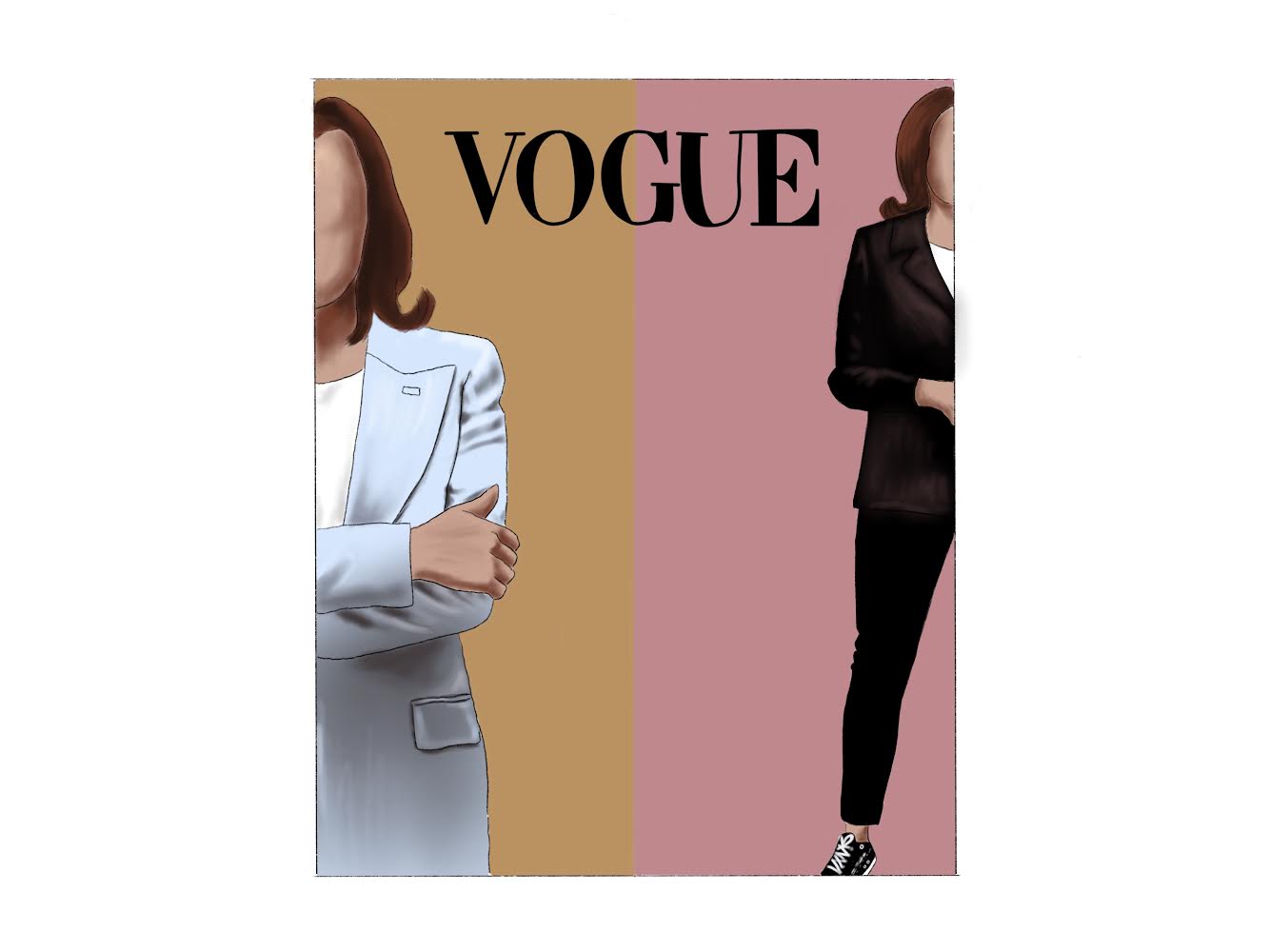Vice President Harris en Vogue
January 31, 2021
Vice President Harris’ casual Converse look truly en Vogue
Vice President Kamala Harris stands in front of salmon pink and apple green drapes, paying homage to her former sorority, Alpha Kappa Alpha, while wearing a smile reflecting her victory.
With her simple outfit, which consists of a black blazer, a pair of jeans and her Converse Chuck Taylors, the drapes symbolize her background and a part of her past that led her to make history. They remain a shadow, following her through every step of her journey, even for a magazine photoshoot.
Her pose radiates her confidence regardless of how extravagant or modest her clothes may be as she folds her hands and flashes a glowing smile — a smile reassuring the American people that the U.S. will be in good hands with her aiding President Joe Biden in leading the country.
However, Vogue’s February 2021 issue cover attracted criticism online debating whether the cover served as an act of racism toward the first African-American South-Asian vice president. The reason behind these disagreements showed a connection to Harris’ outfit choice and overall execution of the cover.
Despite multiple arguments that Vogue’s print magazine cover of Harris disrespects both her and fellow African Americans, the cover signifies the impact her former sorority had on her life while reflecting her affable image and a victory to the U.S. Black population.
Vogue faced criticism on Twitter for disrespecting the vice president with a cover that seemed to lack effort and thought. In reality, the utilization of Alpha Kappa Alpha’s official colors symbolizes both Harris’ background and an important aspect of her life that helped lead to her success.
“We weren’t just told we had the capacity to be great; we were challenged to live up to that potential,” said Harris in the Vogue article, referring to her sorority. “There was an expectation that we would cultivate and use our talents to take on roles in leadership and have an impact on other people, in our country and maybe even the world.”
And she did indeed take on a role of leadership — one that influences an entire country.
While some Twitter users claim the execution appears below Vogue’s usual standards, the concept of the drapes does not solely function as a background for a magazine cover; it serves as a reminder for the world that Harris knows where her success lies. Instead of choosing a background to attract attention, Vogue chose drapes that represented a piece of who she is.
“The pic itself isn’t terrible as a pic. It’s just far, far below the standards of Vogue. They didn’t put thought into it. Like homework finished the morning it’s due,” said LGBTQ activist Charlotte Clymer in a tweet, according to an article from The Guardian.
Harris respects her past and acknowledges that her sorority communicates the importance of her racial heritage.
The salmon pink drape hangs in the center foreground and glides onto the floor, creating a pleasant illusion of a soft cloud from the delicate folds and wrinkles, causing some critics to condemn Vogue for the messy setup. However, the overall image depicts a graceful reflection of the vice president.
In addition to the controversy regarding the cover’s background, the public criticized the lighting in the cover picture, claiming that it acted as a whitewashing attempt to lighten Harris’ skin tone. In reality, it directs the attention to Harris.
While the lighting may be different from past issues, Harris does not blend in — she stands out. Her figure forms a bold silhouette against the pastel background, captivating the audience’s attention to her.
But no matter the setting or lighting, Harris matters the most in the picture. Her smile appears as wide as always, reflecting her happiness as she represents an over looked group of people and inspires young women around the world.
Another argument that surfaced targeted her outfit choice, particularly drawing attention to her iconic Converse Chuck Taylors, but this re-establishes her approachable personality.
“The team at Vogue loved the images Tyler Mitchell shot and felt the more informal image captured Vice President-elect Harris’ authentic, approachable nature — which we feel is one of the hallmarks of the Biden/Harris administration,” said an unnamed Vogue representative in a L.A. Times article.
Her casual blazer, pants, and Converse — shoes that many teenagers and adults wear in their day-to-day life — combined with her smile remind the people of the U.S. that before serving as the future vice president, she is a human, just like the rest of the country’s residents.
Vogue’s photographer for the cover, Tyler Mitchell, faced criticism for his photos, which sparked disputes on whether the cover represented an intentional act of racism on Vogue’s and its editor-in-chief, Anna Wintour’s, part.
“What a mess up,” said New York Times contributor Wajahat Ali, according to The Guardian article previously mentioned. “[Wintour] must really not have Black friends and colleagues. I’ll shoot shots of VP Kamala Harris for free during my Samsung and I’m 100% confident it’ll turn out better than this [Vogue] cover.”
The article also said that Wintour has been accused of racism for previous covers on people of color, such as the August 2020 edition on gymnast Simone Biles.
“I hate the toning, I hate how predictable they are … and I super-hate that Vogue couldn’t be bothered to hire a black photographer,” said Morrigan McCarthy, a past national picture editor at The New York Times, in a July 9, 2020 tweet.
The cover does not constitute a racist action, especially considering that Mitchell works as the first and only Black photographer for Vogue. However, for those claiming that the photographer disrespected the vice president, the fact remains that a Black photographer would not discriminate against Harris, who shares his racial ethnicity.
As the vice president, Harris deserves respect for her accomplishments.
Harris’ historic victory symbolizes a tremendous milestone for the Black community, which has been shunned and disrespected constantly by the media and people in their daily lives. Their people have been discriminated against since the founding of this country, and it is not likely that Mitchell would publicly ridicule someone whose history is similar to his.
Although her outfit could indeed have been more extravagant, considering it may have been plain compared to other covers — ultimately, this was her choice.
If Harris felt that her setting and clothing did not do justice, she has the power to object as both the vice president for the next four years and a grown woman with the ability to speak up when something seems out of place.
However, according to a Jan. 19 CNN article, Vogue decided to release a limited number of special edition print issues with the alternative, online edition cover featuring Harris in a Michael Kors suit against a gold background.
In the previously mentioned article from The Guardian, an anonymous source from Harris’ team revealed that they believed that Harris wanted the cover to portray her in a light blue Michael Kors pantsuit, but Vogue’s latest decision seems unnecessary.
The original print cover remains a proper choice on Vogue’s part despite many complaints. Harris chose to wear Chuck Taylors, jeans and a blazer. She cast her decision and simultaneously made a statement.
Harris maintained her approachable persona and reiterated that she is not here to diminish the people of America. She stands as a vice president who appreciates her history and respects it.
When her inauguration took place on Jan. 20, she officially made her place in history, leading America in her blazer, pants and Converse Chuck Taylors, reminding the people of this country that they voted for the right woman.
For Harris’ future magazine shoots, Vogue set the standard for the effort and consideration put forth into the final product. The cover told a story — a story signifying an important aspect in the vice president’s journey.
She will create more stories for magazines to capture and go beyond expectations as she did when she won the vice-presidency.

Patel is also involved in the Advancement Via Individual Determination program — which she is co-president of — as well as many clubs such the Indian Student Association and the SHHS DoSomething Club, which she founded. Her hobbies include reading (mostly fantasy and romance novels) and listening to music.
Original Vice President Kamala Harris print cover a cover-up for racism and prejudice at Vogue
Option one depicts her sporting a powder blue suit while standing in front of a beautiful gold and tan backdrop.
Option two, with green and pink drapes messily hung in the background, shows the vice president wearing a basic black blazer with a plain white blouse and Converse Chuck Taylor sneakers. Her arms are clenched over her torso while she stares off to the side.
Of the two options, the first better conveys the power and gravitas befitting of the first Black-Asian female vice president.
Yet, Vogue chose that image of vice president Kamala Harris as its cover photo for its February 2021 print issue, while showcasing the better photo only on a special inaugural issue.
Only a limited quantity of this special inaugural issue are printed with the alternative cover; the main print issue will remain unchanged.
Whether any intentional foul play occurred by the Vogue staff, the chosen print issue cover clearly did not suit the first Black-Asian female vice president.
When Vice President Kamala Harris landed the cover of Vogue magazine, an anonymous source from Harris’ team claimed that the image selected was not what it had agreed on.
Harris’ team had complete control over her clothes, hair and makeup, according to The Guardian, meaning that they chose both outfits displayed. However, Harris’ team and Vogue had reached an agreement to display the first formal option on the print cover instead of the casual one.
After viewing the two different cover photo options, initially from a Twitter leak on Jan. 9 and then when Vogue editors themselves released it the next day, many journalists, members of Harris’ team and some internet users expressed outrage. The casual photo choice did, after all, seem rushed, unprofessional and overall underwhelming for what should have been a monumental issue.
A minority of people, however, did support Vogue’s cover, praising them for featuring a powerful Afo-Asian woman on the cover.
According to Vogue’s website announcement on Jan.11, the pink and green fabrics draped in the background paid tribute to Harris’ college sorority, the first African American sorority, Alpha Kappa Alpha at Howard University, while her clothes conveyed her approachable and laidback nature.
Regardless of what Vogue aimed to accomplish with the cover, it only diminished Harris’ character along with her monumental Nov. 3 election victory.
Others criticized the overall quality of the photo, saying that it did not meet Vogue standards as well as past issues have, like the recent December 2020 issue showcasing singer Harry Styles wearing a blue dress and black blazer while posing in a field.
Professional photographers even took to social media outlets like Twitter to confirm that Vogue produced a cover at substandard quality, at best. In their professional opinion, the Vogue cover had terrible lighting, an unflattering pose and subpar editing.
In light of all the criticism, it is almost unbelievable that Vogue unapologetically stuck with its original and truthfully inferior choice, instead of changing it.
A Vogue spokesman told The Guardian that the picture was chosen because it better “captured Vice President Harris’ authentic, approachable nature, which … is one of the hallmarks of the Biden/Harris administration.”
In response to the valid criticisms of the print cover, Vogue decided to print a separate special inaugural edition with the golden photo, as stated in a Jan.19 Twitter post, “In recognition of the enormous interest in the digital cover, and in celebration of this historic moment, we will be publishing a limited number of special edition inaugural issues.”
Though Vogue’s intentions may have been sincere, its laughable execution only diminished the effectiveness of its issue.
As much as America appreciates seeing politicians depicted as “normal people like them,” Harris’ victory is anything but normal; it is historic.
As the first woman to ever be elected the second highest position of the United States, Harris should have instead been portrayed with her more formal photo in a powerful and respectable manner. By reducing her to nothing more than an ordinary person, Vogue ignores all the glass ceilings she shattered throughout her career.
Vogue editors should have taken advantage of this opportunity to showcase our first female VP and the fact that they did not is solely the fault of the editor-in-chief, Anna Wintour.
According to a New York Times news article published on Dec.15, 2020, Wintour has been accused of sidelining ethnically diverse photographers and running offensive stories; this is not the first time Wintour has inadvertently silenced minorities. Although it should be noted that Tyler Mitchell, the first Black Vogue photographer to shoot a cover photo, shot Harris’ cover photos.
As the only person who could make or reverse such an important decision, Wintour should have recognized the transparent fallbacks of her actions. Instead, her ignorance and disinterest caused serious harm to any Americans who support Harris and the progress her election has made.
Harris’ accomplishments inspire women, minorities and disenfranchised people all over the country — people symbolically honored with our vice president-elect’s appearance on the magazine’s cover. However, Vogue’s incompetence ruins this noble goal.
Ultimately, Vogue made the right decision in publishing the special editions with the cover agreed by both the Vogue editorial board and Harris’ campaign.
In the future, publications should be more aware of the implications of not putting in adequate effort, especially when featuring minorities who have rarely been represented in media.

When Thaker isn't writing stories and interviewing others, she is buried in homework, volunteering, interning for the New England Academy or focusing on club activities. In her free time, Thaker enjoys playing with her puppy, Arya, and reading dystopian fiction books.

